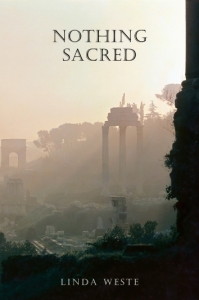
Nothing Sacred by Linda Weste
Australian Scholarly Publishing, 2015
Linda Weste’s Nothing Sacred provides an eclectic, erotic and sometimes profane insight into the private and public lives of Republican Rome. The combination of historicity with sensory poetics provides an immersive, visceral reading experience. And there is immediacy about the submersion in place – the reader is there from the first line, walking through the ‘peat bog haze’ and ‘streamers of blood’ of the eternal city.
The novel-in-verse is an ideal medium for a work that is as much about place and story as it is voice – allowing the author to ventriloquise both the language of Rome’s ‘dung-smeared cobbles’ – and the machinations of the ruling elite. Streetscapes that are teeming with vice testify the Roman preoccupation with excess; the spectacle and sport of violence epitomised by the Circus Maximus. After reading Nothing Sacred, an insight is gained into the psychology behind the cruelty. And while there’s clearly an appetite for gratuitous violence, it seems almost beside the point. The Romans understood the poetry beneath the theatre and spectacle, the quest for glory and victory against insurmountable odds, irrespective of personal and public cost. Nothing Sacred channels this jubilation, lust and violence, creating a poetics of tragedy and defeat.
Quest for dominion, political intrigues, betrayals and coups are central to Nothing Sacred, but what really captures the reader is the more subtle interpersonal dynamics between characters. While this historical novel-in-verse focuses on the Pulchrii siblings, Clodius Pulcher and the infamous Clodia Metelli, the collection employs a multiplicity of perspectives. Latin terms are italicised and listed in the glossary, anchoring the contemporary reader to antiquity, engendering careful reading. Because changes in point of view are not annotated, readers have to work hard to locate themselves within the story, negotiating plot and identifying character by means of voice. Happily, voice works well to this end: largely distinct and strong characters emerge through Weste’s polyphonic flair. The combination of external and internal events, the shifting perspectives and Latin phrasing, all serve as cues to the reader to slow down, fully chew and digest the verse itself.
Purposefully crass and distinctly Aussie slang is peppered throughout the text and transmuted into poetic simile and metaphor. Cicero and his protégé are likened ‘an arse to underwear’. Other gems include ‘Jupiters balls!’ and ‘The lot can’t even piss straight.’ This practice of melding antiquity with contemporary wordplay and modern vernacular creates a kind of jocular intimacy with the present day reader. This playfulness with time and place seems to eschew conservative academic readings of antiquity and serves to make Nothing Sacred more accessible.
Whereas Cicero’s stilted pomposity is signified by staggered oratory, the poet/Playboy Catullus’s erotic bathos is almost Truman Capote in his well-timed delivery in ‘WORKING THE ROOM, 1’:
Move on, Catullus: It doesn’t do to do my father’s friends. Pity: so refreshingly urbane.
In contrast to the poet Catullus, Clodia, known as Lesbia in Catullus’s poems, is part Dorothy Parker and part Dorothy Porter; her voice is sharp and incisive as a blade. Clodia is, to use the modern vernacular, sex on a stick. But despite her desire being ‘straight,’ there’s a queerness to its expression. Clodia, the rumoured lover/love object of the Roman poet Catullus, is given poetic agency in her own right here. Her poems depict a sexually rapacious and ruthless quest for power and satisfaction of bodily desire. It’s clear from the other character’s perspectives that she embodies numerous ‘unfeminine qualities.’ For men like Cicero and Catullus, she both elicits and embodies a heady combination of lust and power. In ‘TREATMENT,’ Clodia describes acts of self-love:
My desire’s dressed up With nowhere to go, again. I’m even tiring of my olisbos My reliable, leather-bound friend.
The sexual innuendo is nothing if ‘deviant’ in contemporary terms, not only in the voicing of taboo (incestuous) desires, but also in the subversion of masculine and feminine codes of desire. Catullus, pining for Clodia, is passive and feminised, while Clodia figures as the dominant sexual and political force; not a muse but actor and director of erotic and political events:
He’ll vouch for my sparrow’s safe return. He’ll recall my pet my plaything in my lap or at my breast and wish himself wings.
Clodia’s identification with and love for the doomed brother Clodius is perhaps the most moving of all desires the text represents. Here, it is encapsulated by elegiac verse in ‘OPEN ALL HOURS (CLODIA’S POEM FOR CLODIUS)’:
Wherever you go, you’ll start a brawl So take with you your incendiary words, your ravishing inflammatory smile; Let your wild eyes Your monumental thighs burn girls, burn boys
Poem titles take on a heightened significant in novels-in-verse. Denoting place, signaling scene changes, as well as setting psychological tone, there is much onus on the title to execute fabula with fabulous economy. Some titles in Nothing Sacred are descriptive of scene or signal a change in poetic medium (many poems are epistolary), but ironic titles like ‘WORKING THE ROOM,’ ‘QUICK LEARNER,’ and ‘ASKING FOR IT’ are a nod-and-wink to the modern reader. They are a conveyance for the intermingling of antiquity and modernity in this text, as well as a tacit suggestion that the grand themes – victory, glory, desire – transcend time and place. Far from a ‘legacy of bone and ash’ these lines are but a waiting invitation to enter a living, breathing, gritty, dangerous and eternal Rome.













